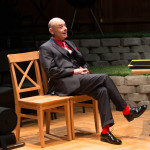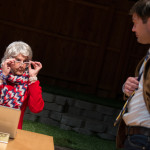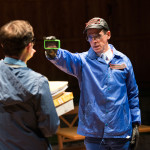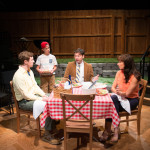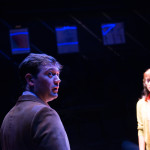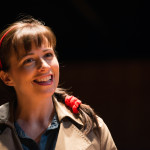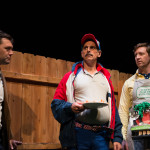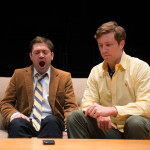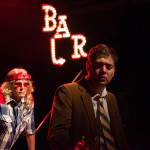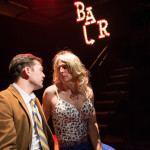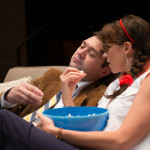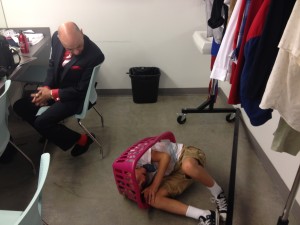Photos by Seth Feeman
Excerpts from reviews
Full reviews are below
“One of the joys of a small repertory, like the one at CATF, is that you get to see actors assume a wide variety of roles. . . . We become so enamored of our favorite actors in ‘signature’ roles that we forget something: the test of a true actor is the ability to assume a wide array of personae, each of them fully realized and memorable. . . . The truly enjoyable aspect of this evening is the performances, which are spot-on and mind-expanding, given the other roles many in the cast play elsewhere in the Festival. Coiner and Sellars also appear in the mainstage production of On Clover Road, as an incredibly creepy cult leader and his predatory minion respectively. To see them transformed into a clueless geek and an equally clueless magnate is priceless. . . . T. Ryder Smith, whose turn as the prisoner Sergey in We Are Pussy Riot is truly memorable, is in character-actor heaven as he morphs into a secretary one minute, barkeep the next, well-stacked washed-up blonde bombshell in stiletto heels, paunchy brother-in-law (I’m sure I missed a one or two). Smith earned well-deserved applause for his protean talents. . . . Weller’s dramaturgy is fairly conventional, so if you want edge you should definitely look for other plays in the repertory here. But here’s the deal: even if you’d rather have another root canal than sit through another cleverly conceived rom-com, you have got to see The Full Catastrophe, because it makes a perfect artistic book-end to the company’s work elsewhere in the Festival.” MD Theatre Guide, Andrew White
“An affable romantic comedy . . . Playwright Weller clearly knows his subject matter and displays uncloying empathy for the warps and woofs of marriage. . . . although the dialogue veers into Dr. Phil “How does that make you feel?” territory. . . Catastrophe’s laughs are of recognition . . . You also may relate to the peripheral characters, such as Beth’s ne’er-do-well brother Bruce and a lonely barfly floozie—all played to the hilt by T. Ryder Smith. . . . In Weller’s hands, the familiar is fresh and domesticity the wild frontier.” DC Theatre Scene, Jayne Blanchard
“Given a polished look and pace by Ed Herendeen, CATF’s producing director, with actor T. Ryder Smith supplying a series of hilarious cameos (as a bartender, a courier and more), “The Full Catastrophe” is the Festival’s most successful production, but it feels a bit lightweight. . . . “ Washington Post, Celia Wren
“A twist on the typical modern American romance . . . shows just how funny and futile our modern ideas about love can be. . . . A sarcastic, sweet and witty update of your Leave It to Beaver-esque family . . . T. Ryder Smith clearly stole the show as a variety of characters. Billed in the program as playing “Everyone Else”, Smith moved with ease between a wide variety of characters, hilariously using different character voices for each one. A quick onstage costume change at the beginning of the show astounded the audience and the applause upon the exit of one of his characters in Act II literally stopped the show.“ Broadway World, Johnna Leary
“A weightless and elegant good time . . . There is not one thing in the story to tether it to reality, or trouble us with any true sense of its characters being in any kind of jeopardy, and the presentation of the whole farrago, under Ed Herendeen’s direction, is smooth and amiable. . . . All members of this sizeable ensemble [are] being exclusively portrayed by T. Ryder Smith, a posse of character actors in one. We see him as an executive secretary, a barroom floozy, a clueless sports fan, an understanding bartender, and a waiter. (Combined with his multiple impersonations in We Are Pussy Riot, playing in repertory with The Full Catastrophe, he proves himself a true paragon of his craft.) These vivid character sketches help the time pass so enjoyably we are apt to ignore how little substance and how much air there is in this soufflé.” BroadwayWorld.com, Jack L.B. Gohn
Offstage
Above: Veronica; Bruce; my wigs; pre-show warm-up, I think – Lee Sellars and Sam Shunney
Full Reviews
MD Theatre Guide, Andrew White – One of the joys of a small repertory, like the one at the Contemporary American Theater Festival here in Shepherdstown, is that you get to see actors assume a wide variety of roles. You’re so moved by their performance in one show that you nearly get whiplash when they walk onto the stage at the next show, completely obliterating your memory of their gig the night before. We become so enamored of our favorite actors in “signature” roles that we forget something: the test of a true actor is the ability to assume a wide array of personae, each of them fully realized and memorable.
The vehicle for transformation here is playwright Michael Weller, who’s been on the scene for decades and should require no introduction. Weller’s ear for dialogue, his sense of humor and his craftsmanship are all rock-solid, as is his current show, The Full Catastrophe.
The title should be instantly recognizable to fans of Zorba the Greek; it is Zorba’s weary way of describing marriage and family; it’s a line that has retained its cachet, among guys at least, for well over 50 years—ever since Anthony Quinn first delivered it. [My own favorite quote is so politically incorrect it’s pretty much unprintable here, so I’d better get back to business…]
The Full Catastrophe follows the early career crisis of a certain Jeremy Cook (Tom Coiner), a celebrated linguist whose work has been praised to the skies—but hasn’t gained him a steady job. Desperate for a paycheck he signs on with billionaire and self-taught, self-anointed genius Roy Pillow (Lee Sellers), who has developed an idiosyncratic, by-the-numbers approach to marriage counseling complete with massive 3-ring binders and sealed envelopes.
What Jeremy’s skills as a linguist have to do with marriage counseling—especially given his complete inability to communicate with women—is beyond him. But he is sent out to do an on-site, live-in session with Dan and Beth Wilson (Cary Donaldson and Helen Anker).
Dan and Beth, on the surface, appear to have everything; steady jobs, a well-appointed home, a sharp-witted son, a full rack of wines, you name it. But of course it doesn’t take much prompting to see the raw emotions under the surface, and the burdens each bears—burdens which are only expressed in emotional outbursts over completely irrelevant issues (sound familiar?). And it doesn’t help that Beth, Jeremy’s client, reminds him an awful lot of his ex-girlfriend Paula.
So, that’s the basic plot; but the truly enjoyable aspect of this evening is the performances, which are spot-on and mind-expanding, given the other roles many in the cast play elsewhere in the Festival. Coiner and Sellars also appear in the mainstage production of On Clover Road, as an incredibly creepy cult leader and his predatory minion respectively. To see them transformed into a clueless geek and an equally clueless magnate is priceless. Cary Donaldson, meanwhile, does a modest turn as a pro-forma defense attorney in We Are Pussy Riot but becomes a sort of suburban Everyman here as Dan, the frustrated husband who has hired Jeremy’s counseling services.
Meanwhile T. Ryder Smith, whose turn as the prisoner Sergey in We Are Pussy Riot is truly memorable, is in character-actor heaven as he morphs into a secretary one minute, barkeep the next, well-stacked washed-up blonde bombshell in stiletto heels, paunchy brother-in-law (I’m sure I missed a one or two). Smith earned well-deserved applause for his protean talents.
Rounding out the cast, and fully holding their own, are Helen Anker and young Sam Shunney. Anker has her own turn at double-casting, since Weller calls for Jeremy’s love interest Paula and his wife/client Beth to be played by the same actress. Quick-changes from one role to the other are deftly handled, and Anker reminds us (as if we needed the reminder) that jilted guys often project their memories of a lost lover onto the every woman they meet, to the point where they can’t tell the difference between them. Weller has great fun playing with this phenomenon, and Anker manages the transitions gracefully. As her son Robbie, Shunney represents every young adult’s worst nightmare: a kid who can smell phonies a mile away, and who knows the first answer you give him is a pathetic lie. Like his parents, Robbie has learned to hide his anxieties, however, and he has more than one moment in the spotlight here.
Peter Ksander has given us a finely appointed (albeit surburban-bland) set that transitions nicely from home to hotel to dive bar, and he makes clever use of one corner in the Marinoff’s theatre-in-the-round space to create the great outdoors. There are other details here which are easier to appreciate if you also treat yourself Ksander’s design for We are P***y Riot in the same space.
Director Ed Herendeen’s familiarity with Weller’s style is evident, and he not only has a field day exploiting Smith’s quick-change talents (often achieved on-stage in a matter of seconds) he makes clever use of the Marinoff space in his staging of Skype conversations between Jeremy and Roy, accompanied by D. M. Wood’s clever light cues. He also understands the dynamics of dysfunctional marriages, the subtle cues and passive-aggressive tactics deployed, and gets some moments that are uncomfortably familiar for anyone whose relationships have occasionally hit the rocks.
Weller’s dramaturgy is fairly conventional, so if you want edge you should definitely look for other plays in the repertory here. But here’s the deal: even if you’d rather have another root canal than sit through another cleverly conceived rom-com, you have got to see The Full Catastrophe, because it makes a perfect artistic book-end to the company’s work elsewhere in the Festival. 7.15.15
DC Theatre Scene, Jayne Blanchard – Marriage Mined for Warm Comedy in Weller ‘Full Catastrophe” at CATF – Who better than a feckless linguist with commitment issues to be a live-in counselor for a nice couple from Missouri having marriage problems?
That’s the situation in Michael Weller’s (Moonchildren) affable romantic comedy, The Full Catastrophe, a world premiere at the Contemporary American Theater Festival snappily directed by festival director Ed Herendeen.
Film buffs may recognize the title as a line from “Zorba the Greek,” when someone asks Zorba if he’s married and he replies “Wife, children, house—the full catastrophe!” That somewhat pessimistic line is the best part of the movie for Jeremy Cook (Tom Coiner, perfectly puppyish as the hapless academic), the linguist protagonist in the play. In the mind of his girlfriend, Paula (a whip smart and beguiling Helen Anker), his favorite line speaks volumes on how he feels about matrimony and responsibility.
Communication and getting what other people are truly saying forms the core of Catastrophe, as well as making a statement that some things—like love, for instance—cannot be explained by science or logically parsed like a sentence.
Suddenly without a job or said girlfriend, Jeremy is adrift, until a job offer arrives from a mysterious billionaire businessman, Roy Pillow (Lee Sellars, playing a rich crackpot with showman’s glee). Roy wants to recruit Jeremy as a field researcher—a.k.a. marriage counselor–and practitioner of “The Pillow Method,” a self-help course Pillow devised that puts forth the notion breakdowns in communication between spouses can be solved by perfect grammar and precise word choice.
What the heck, Jeremy gives it a whirl and his first case is Beth (Helen Anker) and Dan (Cary Donaldson, bringing complexities to the nice-guy role) Wilson, from all appearances a pretty happy—if somewhat tense—couple. Jeremy moves in and tries to keep neutral and observe while following The Pillow Method to the letter.
This isn’t easy to do with the couple’s curious, voyeur 11-year-old son Robbie (the excellent, underplaying Sam Shunney)—one of the play’s warmly eccentric details has Robbie being able to analyze water flow when either of his parents shower—hanging around. And then there’s the fact that Jeremy finds himself increasingly attracted to Beth.
As the Wilson’s examine their marriage under Jeremy’s sweetly fumbling ineptitude, Jeremy is forced to face his ambivalence about intimacy and wonder why he avoids commitment at every turn—especially in his relationship with the one who got away, Paula.
While Jeremy struggles mightily to help Beth and Dan, he is further besieged by hilariously declamatory messages from Roy Pillow, who thunders such pronouncements as “There’s a horror at the heart of every marriage and it’s the same horror—THE HORROR!”
Jeremy tries to discover just what that horror is—is it secrets or the fear that your mate won’t love you enough to be with you when things are bad?—and in the process realizes that keeping a cool distance is great for academia and semantics, but not for closeness.
Playwright Weller clearly knows his subject matter and displays uncloying empathy for the warps and woofs of marriage. This feeling of warmth and understanding—although the dialogue veers into Dr. Phil “How does that make you feel?” territory—is carried through in Herendeen’s astute direction.
Catastrophe’s laughs are of recognition, not only seeing reflections of yourself in Beth and Dan’s marriage but also in Jeremy’s reluctance and Paula’s honest passion. You also may relate to the peripheral characters, such as Beth’s ne’er-do-well brother Bruce and a lonely barfly floozie—all played to the hilt by T. Ryder Smith.
In Weller’s hands, the familiar is fresh and domesticity the wild frontier. 7.14.15
BroadwayWorld.com, Jack L.B. Gohn – Linguistic Marriage Counseling and Character Acting in a Comic Soufflé. – For a weightless and elegant good time, it would be hard to beat The Full Catastrophe, by Michael Weller, based on a novel by David Carkeet, now in production at the Contemporary American Theater Festival in Shepherdstown, WV. There is not one thing in the story to tether it to reality, or trouble us with any true sense of its characters being in any kind of jeopardy, and the presentation of the whole farrago, under Ed Herendeen’s direction, is smooth and amiable.
Imagine marriage counseling being conducted by a multinational corporation under the guidance of an eccentric multimillionaire whose technique is to embed a linguist in the home of the distressed family, who is under strict instructions to open an envelope a day and follow the directions written there. The linguist is something of a refugee from a promising relationship with a graduate student who happens to bear a striking relationship to the wife in the marriage (both portrayed by the versatile Helen Anker), so placing him in the marital household is a case of out of the frying pan into the fire for him.
Identifying the problems in either relationship is not challenging in this fantasy world. Instead, Weller resorts to a convenient comic conceit, ascribed to the eccentric billionaire, that at the heart of every marriage is something generically described as “the Horror.” This seems to be defined as “A fear that one’s love isn’t strong enough to weather a true crisis.” Perhaps to a commitment-phobic character like Jeremy the linguist (Tom Coiner), and even to the couple in whose lives Jeremy is intervening, that might prove true, notwithstanding the considerably larger variety of horrors at the heart of some marriages – and the absence of any horror at the heart of others – in real life. Setting aside the billionaire’s intentionally tendentious theory, in dramatic terms the actual problem with the couple, Beth and Dan (Helen Anker again and Cary Donaldson), seems to be nothing more than seven-year itch-style restlessness and garden-variety anomie. Drop a stranger into a situation like that, and the dramatic issue is more likely to be (and in this case is) the extent to which the inevitable attraction between the stranger and the wife does or does not upset the apple cart.
As already stated, this is a comedy, so it gives away little to say that the apple cart survives the challenge still upright. Likewise, it’s a safe bet that Jeremy will develop some insight that will enable him to rekindle something with the graduate student, perhaps with a nudge from the deus ex machina plutocrat. The point of this exercise is not where it ends up but how it gets there, not the destination but the journey.
This particular journey is marked throughout by funny and appealing character acting, starting with Robbie, the couple’s 10-year-old son (young scene-stealer Sam Shunney), a preternaturally sophisticated youngster who is often several steps ahead of his elders in grasping the obvious. To these should be added Roy Pillow, the eccentric plutocrat, a barker-out of gnomic pronouncements that are sometimes on target, but sometimes more than a little ridiculous (Lee Sellars), and “Everyone Else” – all members of this sizeable ensemble being exclusively portrayed by T. Ryder Smith, a posse of character actors in one. We see him as an executive secretary, a barroom floozy, a clueless sports fan, an understanding bartender, and a waiter. (Combined with his multiple impersonations in We Are Pussy Riot, playing in repertory with The Full Catastrophe, he proves himself a true paragon of his craft.) These vivid character sketches help the time pass so enjoyably we are apt to ignore how little substance and how much air there is in this soufflé.
As a soufflé, and a dessert soufflé at that, this play is best consumed at the end of one’s visit to this year’s Festival, after sampling the weightier and more nutritional fare. It is a fine way to see this year’s strong Festival out. (Ending with a preposition, a practice which Jeremy the linguist approves of.) 7.21.15
DC MetroArts, Robert Michael Oliver – Michael Weller’s The Full Catastrophe, based on a novel by David Carkeet, is a comedy, a comedy about marriage and those longing for marriage. It is light-hearted and fun, well acted and directed, and the audience sits as part of its suburban, bourgeois household.
Yet, there is a “horror” buried deep within the play; but don’t worry, that horror is not as scary as the well off and comfortable might imagine it to be, and it is not anything that happiness and a guilt-free existence can’t cure.
The Full Catastrophe is that dysfunctional family comedy, without the dysfunction; it is that family with a terrible secret comedy, without the terrible secret. In other words, it is that suburban family play anomaly.
At the heart of the light-hearted fun is out-of-work, PhD linguist Jeremy Cook, a specialist in early childhood language acquisition. Tom Coiner creates this loveable, yet oddly repressed character, and his rapport with the audience gives Catastrophe its energy.
Jeremy is offered a well paying job by Roy Pillow, CEO of the Pillow Group. Roy is a member of the 1%, one of the ever growing class of billionaires in America. Lee Sellars gives Roy a wonderful, good-natured charm and an unflinching drive.
Jeremy’s new job is as a marriage counselor—who knew marriage counselors made such good money! But, then, Roy Pillow’s brand of marriage counseling isn’t your normal “sit behind a desk and listen” kind of counseling. His is a 24/7, scientific approach that would exhaust even a healthy couple.
Jeremy enters the home of Paula and Dan Wilson, an upscale couple in suburbia USA, with outdoor grill, little league baseball, and wealthy parents on the wife’s side of the family. Paula and Dan are played by Helen Anker and Cary Donaldson; they give the couple just the right amount of real life love and pissed off annoyance to make them the perfect representatives of marriage.
Their son, Robbie, played fabulously by Sam Shunney, couldn’t be more 11-years-old.
Jeremy’s job is to root out the “horror” that is threatening to tear this wonderful family asunder.
Plot number 2 also involves the linguist Jeremy, even though there is absolutely no reason for him to be a linguist, much less an early childhood specialist, as he doesn’t need that expertise to do his job.
Jeremy, it seems, has profound difficulty admitting he loves any one, particularly the love of his life, Beth. Beth, who is also played by Helen Anker, is an MIT grad student in anthropology who could not be more good natured and direct.
When Jeremy enters the Wilson’s home to fix their problems and meets Paula, who happens to look just like his Beth—well, you see where this is going, and it is fun and “horror” for everyone.
The multi-talented T. Ryder Smith offers up a host of characters, most notably a big breasted blonde who earned an ovation after leaving the stage with a smirk. Who said a bit of farce isn’t appropriate for every show?
Directed by Ed Herendeen, The Full Catastrophe keeps true to its light-hearted tone throughout.
Set Designer Peter Ksander and lighting designer D. M. Wood create the iconic suburban setting, with costume designer Therese Bruck providing the casual wear.
To be sure, The Full Catastrophe will not make you reevaluate your marriage, or your divorce, or your values; but no matter your current condition or state of affairs, you’ll find yourself chuckling throughout. 7.31.15
Broadway World, Johnna Leary – Stuffed Full of Laughs. In a twist on the typical modern American romance, The Full Catastrophe shows just how funny and futile our modern ideas about love can be. Dr. Jeremy Cook is a successful linguist, now unemployed, and accepts a mysterious job offer from an eccentric businessman, Mr. Pillow. As part of the “Pillow Project”, Jeremy becomes a live-in marriage counselor to fighting suburban couple Dan and Beth, as the couple tries to hide the fact they need counseling from their adolescent son, Robbie. Complications arise as Jeremy realizes he really has no idea how to work as a marriage counselor, having never been married before, and that he is falling in love with Beth, who reminds him of his old flame who got away. Directed by Ed Herendeen and written by Michael Weller, this sarcastic, sweet and witty update of your Leave It to Beaver-esque family will leave audiences rolling with laughter.
Tom Coiner was phenomenal as protagonist Dr. Jeremy Cook. From his first moment onstage, Coiner displayed a naturally loveable charisma. His opening monologue where he interacted with the audience, established his character and provided the exposition was effortless. Coiner also displayed impeccable comedic timing and his facial expressions or a raised eyebrow were often more than enough to provoke a laugh.
As the fighting family unit, Cary Donaldson, Helen Anker and child actor Sam Shunney worked extremely well together. Cary Donaldson as husband Dan Wilson was an ideal All-American husband, who revealed some hidden depths and rage buried beneath his everyman grilling, sports and beer exterior. Shunney was adorably obnoxious as teenage son Robbie. Some of his one-liners and sarcastic delivery, in between genuine moments of childish insecurity, were highlights of the show.
Helen Anker was stunning in the challenging dual role as wife Beth Wilson and Jeremy’s former love interest who got away, Paula. Anker was charming and warm as Beth, while displaying a sharp wit and determined strength as Paula in flashback scenes. Even though, for the sake of the story, the two characters are meant to look and act extremely similar, Anker made the distinction between the two characters quite clear. A question and answer segment between the couple and Jeremy was expertly timed and one of the best moments of the production.
Lee Sellars as Mr. Pillow give a fantastic performance as the eccentric billionaire in charge of the Pillow Company. Sellars made an impressive transformation in Act II to a much angrier authoritarian figure and still kept the audience laughing.
Though he had the smallest role in the show, T. Ryder Smith clearly stole the show as a variety of characters. Billed in the program as playing “Everyone Else”, Smith moved with ease between a wide variety of characters, hilariously using different character voices for each one. A quick onstage costume change at the beginning of the show astounded the audience and the applause upon the exit of one of his characters in Act II literally stopped the show.
The set for the comedy is a richly designed interior of a modern home, complete with a backyard area and fence on an upper platform off of the main stage. The set designer made the smaller theater feel more spacious and, in a cute twist, has the audience entering the theater through the front door to the home, as though the audience is also coming in as a house guest much like Jeremy. 7.15.15
Communities Digital News, Terry Ponick – Marriage a la mode. The Contemporary American Theater Festival tends to choose dramas that focus on serious things, and that’s appropriate, given that in American culture these days, the certain certainties seem to have gone away. But there’s a ray of comic hope in CATF’s 2015 edition, and it’s called, oddly enough, The Full Catastrophe.
Michael Weller’s world premiere comedy charts the misadventures of Jeremy Cook (Tom Coiner), a renowned but currently jobless professor of linguistics. Desperate for a bit of income, Cook agrees to serve as a live-in “marriage counselor” for a troubled couple, Beth and Dan Wilson (Helen Anker and Cary Donaldson). The story line of the play is based on a novel by David Carkeet.
Jeremy will be more than adequately compensated by brusque, no-nonsense businessman Roy Pillow (Lee Sellars) who’s employing him to try out Pillow’s soon-to-be-famous course for repairing marital unions that have hit the rocks.
Everything’s good to go, but there’s a minor problem to which no one initially pays much heed: “Counselor” Jeremy has never been married himself. Worse still: Beth reminds him of Paula, the girl that got away from him many years ago. As they say in a standard play synopsis: Complications ensue.
In this “Catastrophe,” however, those complications are funnier, sadder and a lot truer than you’ll see on network TV sitcoms. Weller provides enough expected and unexpected twists and turns to keep the audience guessing all evening. Plus, there’s that wild-card part of “Everyone Else,” a series of minor characters all portrayed by T. Ryder Smith that adds a special element to the mix. But we’ll get back to that in a moment.When it comes to the age-old topic of marriage, that famous quote from Tolstoy’s “Anna Karenina” always seems to come to mind; namely, “All happy families are alike; each unhappy family is unhappy in its own way.” That famous Russian novelist’s famous observation proves true for the family of Beth and Paul Wilson.
Married long enough to enter the familiar territory of the bored and alienated couple, Beth and Paul also have to put up with their precocious but equally bored young son Robbie (Sam Shunney), who ingeniously manages to scope out what’s going on in both his parents’ lives and that of the family’s purportedly expert, live-in marriage counselor, Jeremy Cook.
Robbie complicates Cook’s work considerably, although Cook is often his own worst enemy. Absent-minded to a fault like many decent professors often are, he either ignores or misinterprets Roy Pillow’s “sure-fire” scripted counseling and investigative outlines, infuriating Pillow and completely confusing the couple he’s allegedly attempting to help.
Worse still, how about Jeremy’s own problems. We hear these days about “emotional triggers.” Too bad for Jeremy that Beth Wilson very much reminds Jeremy of a devoted grad student he once courted and then ignored, ultimately losing her forever when in fact, he really cared.
A little bit of psychological displacement adds further needless complications as Jeremy finds himself falling in love with Beth, triggering fond and sad memories of Laura (also played by Helen Anker), the girl he left behind but didn’t mean to.
Weller’s situations, human interactions, dangling conversations and superficial smiles all ring true in this drama. This will prove particularly true for those in the audience who are currently or have been formerly involved in one or more marriages—a verifiable fact to which this critic, a 44-year veteran of (mostly) married bliss, can readily attest.
Weller gets both the rights and the wrongs of Marriage 2015 amazingly right. As a result, the audience ends up not only identifying with the Wilsons, but also cheering for them to pull their marriage out of the family barbecue pit—Jeremy Cook, Roy Pillow, son Robbie and Beth’s good-for-nothing brother (also played by T. Ryder Smith) notwithstanding.
Unusual touches in Weller’s play are worth noting, too, namely the essential good natures of the major characters—or most of them—as well as the surprisingly old-fashioned morality and ethics that serve as bedrock for his story. In a time when even common decency seems to be under public attack and ridicule, this is a refreshing attitude on the part of a playwright, and maybe even a brave one.
The acting in Full Catastrophe is considerably above average. Tom Coiner’s confused and confusing character, the central intelligence of the play, is the very essence of the contemporary, disconnected academic. That said, he’s also grounded, via his field of linguistics, in ways that many professors are not, particularly in his appreciation of the nuances of the language. This, plus his fumbling but often well-intentioned goofiness toward women—even those he loves and/or admires—is typical and refreshingly honest.
Likewise, although each experiences his or her irrationally idiotic moments, Beth and Dan are a typical, youngish, 7-year-itch kind of couple who’ve hit a brick wall, are considering starting all over again, perhaps with someone else. But deep down, we know they really don’t want to split. They just don’t know how to get out of the black hole they’ve been digging for their relationship. And the antics of their brainy but devious son—who actually is just as scared as they are—don’t seem to be helping.
Helen Anker and Cary Donaldson provide just the right touches here to make us care about their characters. That’s essential to a successful, final resolution of this play, which alternates enough predictable moments and enough surprises to keep everyone guessing until very near its end.
Lee Sellars provides the perfect helping amount of bluster and greed to make Roy Pillow, Type-A business guru extraordinaire, a believable, scary and funny antagonist. It’s as if this veteran actor shoce to channel his inner Donald Trump during rehearsals. The Donald’s sweeping, know-it-all pronouncements on all aspects of life also seem to be the kind of natural expression Roy Pillow would embrace.
Sellars anchors this complicated tale, lightening the action with a comically heavy-handed touch that proves, in the finale, to be an unexpected delight. So who gets fired? You’ll have to see the play to find out.
Sam Shunney portrays the Wilsons’ son Robbie as the kind of good but cynical kid we all either know or endure. He’s a frustrating combination of smart, smart-ass, worldly and naïve. He’s the kind of kid who can frustrate adults by effortlessly turning their iPhones into supercomputers and using the Internet to nose around wherever you don’t want him to go.
But Shunney’s Robbie is also secretly frightened that his parents might split, causing his comfortable world to collapse and leaving him perilously vulnerable—a fact he does his best to hide. It’s a great interpretative performance for this young actor.
Last but in no ways least is T. Ryder Smith who, as we’ve already noted, plays “Everybody Else.” From a curt female receptionist, to Dan Wilson’s good-for-nothing, meddling brother-in-law, to another surprise or two in between, Smith gets to portray every manner of annoying walk-on nut-case. He even manages to add a piquant dash of gender-bending fun to the proceedings—this at a time when loose lips can sink career ships as no less than comedian Jerry Seinfeld has duly noted.
Ongoing subversiveness is great fun and is actually the very essence of comedy. Smith has fun pulling it off, and the audience has even more fun watching how things unfold in its aftermath.
Weller’s carnival of sometimes badly mismatched souls is presided over by Ed Herendeen, who directs this production. He keeps his cast focused, and maintains a steady, brisk pace, a key element keeping this almost farcical style of comedy on the move and in your face. Yet Herendeen also manages to help the cast remain in character without resorting to caricature. Without that kind of subtle grounding, we’d find this whole, crazy menagerie hard to believe.
Michael Weller’s The Full Catastrophe may not prove to be the immortal comic classic of its time. But, in its honesty, audience friendliness and warmth, and refreshing lack of snideness and cynicism, it succeeds as a bright comedy drama that captures the moral confusion of our age and offers a hopeful antidote. 7.23.15
Washington Post, Celia Wren – 2015 Contemporary American Theater Festival sets the stage for rebellion. Now celebrating it’s 25th season, the prominent annual showcase for recently-minted plays is presenting five works that deal with small groups of renegades bucking the status quo. The scripts are no terribly satisfying, mostly falling into the spectrum that connects the flowed-but-interesting with the sleek-but-unremarkable. Still, as is invariably the case at the festival, the performances are top-notch. And frequent theatre-goers may particularly enjoy rooting for the repertoire’s insurgent protagonists. After all, in our society theatre itself is something of an insurgent art form, struggling against the dominance of screen entertainment.
Perhaps not coincidentally, the rebellion of creative people is the subject of two of the festival’s more intriguing plays: Johnna Adams’s “World Builders” and Sheila Callaghan’s “Everything You Touch.” “World Builders” is less taut and vivid than Adams’s harrowing “Gidion’s Knot,” which premiered at the 2012 festival, but it does share the earlier play’s concerns with loss, freedom and the possibilities of transgressive imagination.
Directed by Nicole A. Watson, “World Builders” focuses on Max (Chris Thorn) and Whitney (Brenna Palughi), who are enrolled in a clinical trial for a new psychiatric drug. Both characters have schizoid personality disorder and are given to obsessing over imaginary worlds. As the two develop feelings for one another, they also confront the fact that their new medication may kill their fantasy lives.
Adams hasn’t found a way to make Max and Whitney’s fantasy experience as powerful to the audience as it is to the characters themselves, so the talked-about loss of it registers intellectually but not emotionally. The play also takes too much time to wind up and down. Still, Thorn and Palughi ace the job of showing how the drug gradually affects their characters’ perceptions and mannerisms. And although “World Builders” may be emotionally underwhelming, it does pose profound questions: Who gets to decide what it means to be a fulfilled human being? W, such as who defines what is normal?.
The question of what’s normal — as opposed to what’s elite or exceptional — also figures in Callaghan’s “Everything You Touch,” a smart but diffuse tale of haute couture, family and the importance of self-esteem. Victor (Jerzy Gwiazdowski, radiating prickliness) is a self-absorbed designer in 1970s New York who — shockingly, to his fellow fashionistas — experiments with creating clothes that ordinary people might actually wear. About four decades later, Jess (Dina Thomas), a dumpy computer geek, musters the courage to visit her dying mother. Toggling back and forth in time, the play teases out the connection between the two characters.
Directed by May Adrales, with costumes by Peggy McKowen (the festival’s associate producing director), “Everything You Touch” begins with a breathtaking sequence in which a New York trash heap morphs into a runway of models in outlandish garb. (David M. Barber designed the stylized cityscape.) And that scene isn’t the show’s only eye-catching touch: Throughout the play, the performers who depict models double as elements in Jess’s physical environment — holding out a hand to depict a car’s rear-view mirror, for instance. The conceit underscores one of the play’s themes: While some beautiful individuals may revel in the public’s gaze, others can feel simultaneously objectified and ignored.
First staged in Pasadena, Calif., in 2014 (it’s the only festival offering this year that isn’t a world premiere), “Everything You Touch” brims with ideas and rich language, but it runs low on dramatic conflict.
That’s not a problem with Michael Weller’s comedy “The Full Catastrophe,” based on a novel by David Carkeet. The play follows Jeremy Cook (Tom Coiner), an amiable linguistics scholar recruited by a maverick billionaire named Roy Pillow (Lee Sellars), to take part in an iconoclastic research experiment.
Pillow thinks he has found a way to fix foundering marriages: embed a linguist in the household to spot, and correct, miscommunication between spouses. As Jeremy discovers, that strategy is trickier than it sounds. Installed in the home of Beth and Dan Wilson (Helen Anker and Cary Donaldson), Jeremy manages to infuriate both his hosts and Pillow. Moreover, his romantic past returns to haunt him.
Given a polished look and pace by Ed Herendeen, CATF’s producing director, with actor T. ryder Smith supplying a series of hilarious cameos (as a bartender, a courier, and more), “The Full catastrophe” is the 2015 festival’s most successful production, but it feels a bit lightweight.
Another burnished piece, Steven Dietz’s “On Clover Road” directed by Herendeen, is a grom twisty, and none too memorable thriller about a cult.
The biggest disappointment is the high-profile festival commission “We Are Pussy Riot,” a misconceived and sometimes wince-inducing grab-bag of ideas and approaches, written by Barbara Hammond and directed by Tea Alagić. The play deals with the 2012 trial and conviction on hooliganism charges of members of Pussy Riot, the celebrated Russian protest group and punk band that staged a political stunt in a Moscow cathedral.
In a program note, Hammond writes that the dialogue in her trial scene is lifted almost exclusively from transcripts and that other lines reproduce public statements made by Pussy Riot members, Russian leader Vladimir Putin and other figures. That documentary-style strategy could have been powerful, but this production adds stylistic elements that distract from, and even seem to trivialize, the historical testimony.
For instance, in the trial scene, when the prosecutor (Smith) reads out the charges, a burst of beatific choral singing rings out and the lighting pins him with a halo-like spotlight. At another point, as Nadya, Masha and Katya (Liby Matthews, Liba Vaynberg, and Katya Stepanov) make courtroom statements, the lawyers, (including Donaldson as the defense attorney) slither from their chairs and lie prone on the floor.
The play also features audience participation (on opening night, one poor patron was marched onstage and grilled about her religious beliefs), rowdy street-theater sequences and a tale of a non-celebrity Russian political prisoner (Smith). Presumably, the defamiliarizing techniques and lack of continuity aim to echo the disruptive effects of Pussy Riot’s political art.
But the show’s theatrical bells- and- whistles ultimately come across as incoherent and self-indulgent, overshadowing the activists’ original act of witness. 7.14.15
A Honey of an Anklet blog – Michael Weller’s adaptation of David Carkeet’s novel, The Full Catastrophe, is an entertaining comedy of relationships that doesn’t reach too far. Jeremy Cook, a professional linguist down on his academic luck, takes a position as an unconventional marriage counselor with the Pillow Group, led by eccentric magnate Roy Pillow (Festival favorite Lee Sellars). To say that Pillow’s methods are opaque would be utter understatement.
In bringing the book to the stage, Weller excises an unnecessary subplot of professional jealousy but retains Jeremy’s point of view narration. If the early passages are a bit too expositional, Jeremy’s wry asides to us are usually worth it. T. Ryder Smith, covering the ensemble roles (his program credit is “Everyone Else”), earned his ovation for his last character’s final exit. 7.13.15
[previous] [next]


